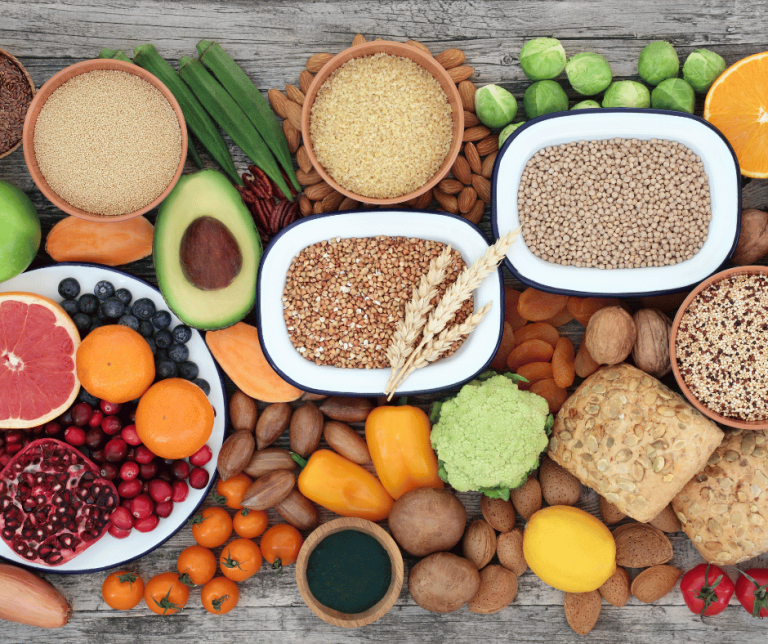
Poop & Weight Loss/Gain: How Your Bowel Health Impacts Your Scale
Your scale isn’t measuring fat — it’s measuring what your gut hasn’t let go of. Hidden stool retention, slow motility, and gut bacteria can quietly

Home » Top 10 Foods to Promote Digestive Health: A Comprehensive Guide
Maintaining good digestive health is essential for overall well-being. A healthy digestive system ensures optimal nutrient absorption, supports a strong immune system, and promotes a balanced gut microbiome. While there are various factors that contribute to digestive health, diet plays a crucial role. In this blog post, we’ll explore the top 10 foods that can promote digestive health and discuss their benefits. So let’s dive in!
Fiber is a vital component for a healthy digestive system. It adds bulk to the stool, aids in regular bowel movements, and supports a healthy gut environment. There are two types of fiber: soluble and insoluble. Soluble fiber dissolves in water, forming a gel-like substance that helps soften the stool. Insoluble fiber adds bulk to the stool, facilitating its movement through the digestive tract. Incorporating high-fiber foods into your diet can improve digestion and prevent constipation.
Whole Grains: Whole grains such as oats, brown rice, and quinoa are excellent sources of fiber. They provide a steady release of energy, regulate bowel movements, and support a healthy gut.
Legumes: Lentils, chickpeas, and black beans are packed with fiber and offer a range of digestive benefits. They aid in regular bowel movements, promote the growth of beneficial gut bacteria, and reduce the risk of digestive disorders.
Fruits: Apples, berries, and oranges are not only delicious but also rich in fiber. They help maintain bowel regularity, provide antioxidants, and support overall digestive health.
Vegetables: Broccoli, spinach, and carrots are fiber-rich vegetables that promote healthy digestion. They provide essential nutrients and contribute to a well-balanced gut microbiome.

Probiotics are beneficial bacteria that support a healthy gut flora. Including probiotic-rich foods in your diet can improve digestion, enhance nutrient absorption, and boost the immune system.
Yogurt: Yogurt is a popular source of probiotics. It contains live cultures that aid in digestion, promote gut health, and strengthen the immune system.
Kefir: Kefir, a fermented dairy product, is rich in probiotics and offers several digestive benefits. It helps break down lactose, supports a healthy gut environment, and may reduce the risk of gastrointestinal diseases.
Sauerkraut: Sauerkraut is fermented cabbage that provides a wealth of probiotics. It aids in digestion, supports gut health, and may alleviate symptoms of digestive disorders.
Kimchi: Kimchi, a Korean fermented dish, is packed with probiotics and beneficial enzymes. It aids in digestion, reduces inflammation, and supports a healthy gut microbiome.

Ginger and peppermint have been used for centuries to soothe various digestive discomforts. They offer numerous benefits, including relieving indigestion, reducing bloating, and supporting overall digestive health.
Ginger: Ginger possesses anti-inflammatory properties and aids in digestion. It can help alleviate nausea, reduce stomach discomfort, and improve overall digestive function.
Peppermint: Peppermint is known for its calming effect on the digestive system. It helps relax the muscles of the gastrointestinal tract, easing digestion and reducing symptoms such as bloating and gas.
Omega-3 fatty acids are essential for overall health, including digestive health. These healthy fats play a role in reducing inflammation, supporting a healthy gut lining, and promoting optimal nutrient absorption.
Fatty Fish: Salmon, mackerel, and sardines are excellent sources of omega-3 fatty acids. They offer anti-inflammatory benefits, protect the gut lining, and support overall digestive well-being.
Chia Seeds: Chia seeds are a plant-based source of omega-3 fatty acids. They provide fiber, promote bowel regularity, and support a healthy gut microbiome.
Flaxseeds: Flaxseeds are another plant-based source of omega-3 fatty acids. They help promote digestive regularity and provide additional fiber for a healthy gut.
Walnuts: Walnuts are a tasty snack that contains omega-3 fatty acids. They offer anti-inflammatory properties and support overall digestive health.
Turmeric, a vibrant yellow spice, contains an active compound called curcumin. Curcumin has potent anti-inflammatory and antioxidant properties that benefit digestion.
Digestive Benefits: Turmeric aids digestion by stimulating the production of bile, which helps break down fats. It also reduces inflammation in the gut, alleviates digestive discomfort, and may improve symptoms of conditions like irritable bowel syndrome (IBS).
Incorporating Turmeric: You can incorporate turmeric into your diet by adding it to curries, smoothies, or golden milk. Including a pinch of black pepper with turmeric can enhance the absorption of curcumin.
Staying hydrated is crucial for maintaining proper digestive function. Water helps soften the stool, aids in digestion, and prevents constipation. It’s important to drink an adequate amount of water throughout the day and stay hydrated for optimal digestive health.

Certain foods can trigger digestive discomfort or exacerbate existing digestive conditions. It’s important to identify your personal trigger foods and minimize their consumption to support digestive health. Common trigger foods include spicy foods, high-fat foods, caffeine, and carbonated beverages.
Practicing mindful eating habits can significantly improve digestion. Slow down, chew your food thoroughly, and be present during meals. Avoid distractions such as TV or smartphones while eating, as it can hinder proper digestion. Mindful eating promotes better nutrient absorption and aids in maintaining a healthy weight.
Optimizing digestive health is essential for overall well-being, and diet plays a crucial role in achieving this. Incorporating the top 10 foods mentioned in this blog post can help promote a healthy gut, improve digestion, and support overall digestive wellness. Remember to consult a healthcare professional if you have specific digestive concerns or conditions.
Promoting digestive health is a holistic approach that involves lifestyle choices beyond diet. Regular exercise, stress management, and adequate sleep also contribute to a healthy digestive system. By making conscious choices and adopting a well-rounded approach, you can enjoy the benefits of optimal digestive health.
Remember, a healthy gut leads to a healthier you. Take charge of your digestive health by incorporating these top 10 foods into your diet and adopting healthy lifestyle practices.

Your scale isn’t measuring fat — it’s measuring what your gut hasn’t let go of. Hidden stool retention, slow motility, and gut bacteria can quietly

Your poop is a real-time report card on your gut health—and most people are ignoring it. From color changes to weird shapes to the clues

Wheat isn’t the villain—it’s the kind of wheat that’s wrecking your gut. From ancient grains to modern hybrids, discover how today’s wheat triggers inflammation, worsens

Your gut isn’t just digesting food—it’s controlling your hunger, energy, and even how fast you burn fat. Inside you is a powerful hormone called GLP-1,

Happy Poops.
What about your friends?